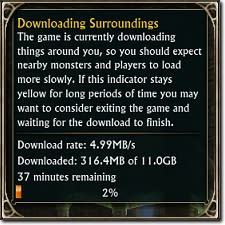MMO Mechanics: Lowering the barriers to entry
In the increasingly competitive MMO genre, games have to do all they can to keep you as a customer. MMOs have traditionally been quite difficult games to really get into since they typically require a considerable time and money investment and we tend to play them for stretches of several months to years at a time. The gameplay in MMOs is inherently social by nature, forcing you to relate to others, and there are some even more fundamental barriers that get in the way of new players signing up. I'm sure we've all enthused and rambled to our friends in the hope that they might check out our most recent gaming crush, only to see a repulsed look on their faces when they realise it's an MMO.
The classic subscription model is a substantial paywall for the average gamer, and this is what has traditionally kept MMOs niche. The early game can be daunting to those who aren't familiar with the genre, and developers pour a lot of effort into easing newcomers into that gameplay. In this week's MMO Mechanics, I'm going to look at how some MMOs manage to break down these barriers through the use of clever mechanics in order to open up MMO gaming to more people than ever before.
Breaking down the paywall
Gaming is becoming an increasingly expensive hobby, and exploring the world of MMOs is no exception. Monthly subscriptions on top of a triple-A pricetag was an expected sacrifice for enjoying the best MMOs, but this hefty fee closed off the genre to those who couldn't see over the top of the paywall. Traditional MMOs earned themselves an air of experiential superiority through this false exclusivity, and this somehow made people want to be part of the club even more. While subscription money keeps rolling in, developers have no interest in changing it, either.
Free-to-play games aim to eliminate this exclusivity by opening up MMOs to the masses. Titles like Neverwinter and Age of Wushu have considerable playerbases, and previously subscription-based games such as RIFT and Star Wars: The Old Republic have managed to keep themselves going by switching to the F2P model. It is much easier to jump into a game if you don't feel pressure to like it; with F2P games, if you don't enjoy playing you simply uninstall and forget about it without any financial loss.
The common refrain is that you can invest as much or as little as you want into F2P titles, since these games incentivise payment in the late game to line the developer's coffers without requiring an upfront payment or monthly subscription. If you can cope with flashy "buy our currency now!" buttons everywhere you look, F2P MMOs may be a great option for extending your gaming repertoire without an initial investment.
Early gameplay that frontloads great content
No matter what business model an MMO uses, it will ultimately make money by attracting players and holding onto them for dear life thereafter. Free-to-play games are commonly criticised for having a lacklustre endgame, but players who make it to the level cap have already invested a lot of time into their characters and aren't going anywhere any time soon. Grindy gameplay may ultimately be an effective way to keep us paying and playing once we're invested in an MMO, but developers will always bait their hooks with something a little more palatable.
The starting areas are usually some of the most highly polished parts of any themepark MMO, and the early levels will typically fly past in a blur of awesome new abilities and epic loot. Before you know it, you've spent several nights of gaming building your newest virtual toon, and then spending a few dollars on a cosmetic upgrade or skin doesn't seem like such a big deal.
MMOs are best enjoyed with friends
As social games, most MMOs spread by word of mouth; we generally like having friends along for the ride as we create, upgrade, and level our characters. It can be very hard to get your friends on board when you have already reached the level cap, though, since they won't want to play without you and you won't gain anything from running through level-inappropriate content with them. Guild Wars 2 is just one example of a game that has attempted to fix that problem by scaling your level down to suit the area you're currently grinding in, and it can even scale you up for certain events. Playing with friends of varying levels doesn't feel like a chore when all the content is gainful.
Dungeons and Dragons Online has a more permanent way for you to join your low-level friends through its reincarnation mechanic. In DDO, you have the ability to reset your character to level one with a few stat perks to aid you on your new journey if you meet the resurrection prerequisites and have some rare Heart of Wood. This offers you the chance to play through the game with a friend without sacrificing every shred of progress you have made, since you can potentially gain new ability points through some forms of reincarnation.
Streaming clients and browser games
With the online gaming market becoming increasingly saturated with casual and free-to-play titles, developers are competing primarily for our attention now that the bandwidth required to download a game client and the effort of installation are the only real hurdles that developers have to overcome. Games like RIFT and EverQuest II have flattened this final barrier to entry with the help of new streaming clients. These tiny executables automatically download game content in the background as and when it's needed, prioritising content from the tutorial areas and early game zones. For the tiny inconvenience of increased load times for zones that haven't been fully downloaded, players can literally be in the game within minutes of first launching the downloader.
While streaming clients can make a desktop MMO much more accessible, browser-based games have been enjoying this perk for over a decade. RuneScape was originally developed in Java specifically so that it could be run in a browser window, making it accessible on any computer. There's no executable to download that can be caught by overzealous antivirus software or require installation privileges, and there's no bulky client taking up space on your hard drive. The tradeoff for this level of instant accessibility used to be accepting sub-par graphical quality, but now HTML 5 has given developers quick and easy access to the computer's GPU, letting them run games with much the same level of pretty detail as a desktop client.
Even filling in a sign-up form and registering an account can be problematic for some players, and it's not always about laziness. In today's world of database hacks and companies selling your details to third parties, registering yet another account on yet another website gives hackers just one more way to steal your password. Many games bypass the signup process entirely by letting you sign in via Facebook, Google Plus, or Twitter. RIFT also allows you to sign in as a guest and create a temporary character, so you can access the game and play through the tutorial within minutes.
MMOs used to be quite closed and exclusive, only for those who wished to play enough to justify the financial and time investments required to fully explore the titles in question. For such a social genre, little provision was made for inviting friends to join in on the fun; level-capped characters had no cause to play with newly created toons, leaving many new players to fight out the levelling process on their own.
New developments have, however, helped smash down MMO exclusivity through new subscription models, innovative character altering mechanics to encourage social play, and new ways to sign up for and access MMOs more quickly and easily. With these walls now rubble around our feet, it's easy to see why the genre has become as big as it is.

MMOs are composed of many moving parts, but Massively's Tina Lauro is willing to risk industrial injury so that you can enjoy her mechanical musings. Her column, MMO Mechanics, explores the various workings behind our beloved MMOs every Wednesday.







